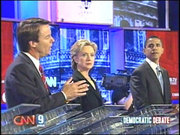Within about a month Democrats will have their next President.
On questions of policy the party is united. The Republican Party has imploded, its various factions at war with one another.
The only real question in the Democratic race is a stylistic one. Which model of leadership do the party’s members feel most comfortable with:
- Nixon, the experienced alley-fighter who will take whatever the other side dishes out and hand their heads to them on a platter;
- Reagan, the avatar of the new ideology, who glides above the fray and assumes himself to be the political center, thus moving things that way; or
- Roosevelt, who challenged his own party to win the nomination, building unity on broad themes and drawing policy from constant experimentation.
Anyone who has followed the race knows which candidate is which:
- Clinton is Nixon, as I’ve written here several times. Her political experience goes all the way back to the dawn of the current thesis. She expresses the anti-thesis to that thesis, has leaned against it her entire political life. And if you hit her, she hits back. Hard.
- Obama is Reagan, as I suggested a few months ago. He intuits the need for a new political thesis, and while he doesn’t express it as I do, in terms of Internet values, he promises a politics of consensus, working outward from agreement.
- Edwards is Roosevelt, which I understood through my personal endorsement. He comes as a populist, defying his own party’s conventional wisdom. A wealthy man who identifies with the working man, again like FDR. A man whose personal struggles have given him greater humanity, again like FDR.
None of these comparisons is precise. Hillary Clinton is unlikely to
create a Watergate scandal, Barack Obama is unlikely to die of
Alzheimer’s, and John Edwards isn’t going to face the twin crises FDR
did.
But these analogies offer choices, a guide you can use to make your own
choice, based on the themes and ideas expressed by the three leading
candidates. It will be interesting to see which path Democrats choose,
and that choice is important. But the general choice, the policy
choice, has already been made.
The Democratic Party stands for universal health care, it stands
against enormous deficits, it will get us out of Iraq and re-engage the
world diplomatically. The Democratic Party stands for a new direction,
and whether they’re searching for it, or claim to have found it, we
all know what that means.
It took a generation to get us into this rut. It will take a party, a
whole party, a whole nation, to start digging out of it. We face
problems far greater than the voters of 1968, and far more momentous
than even those of 1860. The fate of the planet, and man’s place on it,
is on the line.
At the present rate of melting, Florida may disappear within the term
of the next President. Unless the present War for Oil is replaced by a
War Against Oil, more than our autonomy and economy will be lost. Our
children will be on a path toward a far smaller world, one
environmentally damaged beyond repair, a horror show of drought, flood,
and mass extinction the likes of which hasn’t been seen on Earth in 65
million years.
Against this I have offered only the small historical patterns of
American politics, the generational changes which have driven us to
this place, and this choice.
Good luck with it.













Edwards won’t be facing the specific twin crises Roosevelt did, but sure as shooting, he’ll be facing the crises coming down the road this year, some of them whose hot breath is already on our necks.
Crisis #1: The economy is imploding. This is precisely the crisis Roosevelt faced.
Crisis #2: as you pointed out in today’s other article, the Fascism in America crowd is back doing business at the same old store front and peddling it as an answer to –
Crisis #3 – part of the rest of the world is going up in flames. This time it’s the Islamic world, feeling trapped and put-upon in a way Germany felt between the World Wars, but on a far larger scale.
“Happy days are here again….”
Edwards won’t be facing the specific twin crises Roosevelt did, but sure as shooting, he’ll be facing the crises coming down the road this year, some of them whose hot breath is already on our necks.
Crisis #1: The economy is imploding. This is precisely the crisis Roosevelt faced.
Crisis #2: as you pointed out in today’s other article, the Fascism in America crowd is back doing business at the same old store front and peddling it as an answer to –
Crisis #3 – part of the rest of the world is going up in flames. This time it’s the Islamic world, feeling trapped and put-upon in a way Germany felt between the World Wars, but on a far larger scale.
“Happy days are here again….”
After watching Obama’s victory speech and reading some of the reaction around the web I agree with your comparison. Obama is Morning in America for lots of folks.
Warm fuzzy feelings may be a rotten way to choose a president, but it beats fear and loathing.
After watching Obama’s victory speech and reading some of the reaction around the web I agree with your comparison. Obama is Morning in America for lots of folks.
Warm fuzzy feelings may be a rotten way to choose a president, but it beats fear and loathing.
Hooray! I only just found this blog but I like the take on environmentalism. As a Kiwi I thought it an oxymoron that an American actually does care about the planet and not their SUV (and protecting their gas price). (Tongue in cheek!). Unfortunately you have a few too many dopes who rally behind anything jingoistic and hence, you (read: we, the world) get George Bush and his cronies. Not just once, but twice. That sucks. Please don’t let the jingoistic fools vote. Surely there must be something in your constitution that can prevent them.
Hooray! I only just found this blog but I like the take on environmentalism. As a Kiwi I thought it an oxymoron that an American actually does care about the planet and not their SUV (and protecting their gas price). (Tongue in cheek!). Unfortunately you have a few too many dopes who rally behind anything jingoistic and hence, you (read: we, the world) get George Bush and his cronies. Not just once, but twice. That sucks. Please don’t let the jingoistic fools vote. Surely there must be something in your constitution that can prevent them.